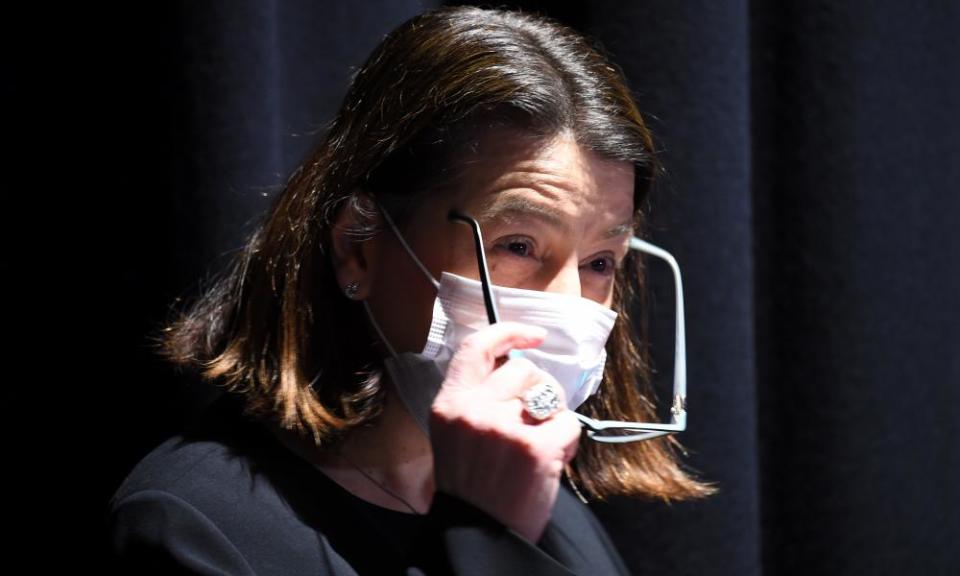Coronavirus: Victoria to home-test vulnerable people as 322 new cases and 19 deaths reported

People with disabilities and chronic health conditions will no longer have to try to find transport to get to Covid-19 testing clinics after the Victorian government announced home-testing for vulnerable people.
The premier, Daniel Andrews, announced on Monday that while the number of new cases had dropped to 322 overnight – significantly lower than the 725 cases announced one week earlier – there are 19 more deaths from the virus. Those who died overnight ranged in age from their 50s to 90s, and 17 of those deaths were linked to aged care.
“There are 640 Victorians in hospital, 47 of those are in intensive care and 31 of those 47 are on a ventilator,” Andrews said. “There are 1,065 healthcare workers who are active cases.”
Related: Melbourne Uber drivers fear for their health as they transport passengers to Covid-19 tests
The state’s health minister, Jenny Mikakos, said it was challenging for those who are sick or disabled to get to a testing station, particularly with strict lockdown measures in place and with government advice discouraging use of ride share and public transport.
“So we are starting a call-to-test program that will enable someone to call our coronavirus hotline.” Mikakos said. “They will be able to get tested within a 48-hour period. It is a free service and will be available throughout Victoria. The way that people will be able to access this is through the coronavirus hotline. There’ll be a triage there, and with a GP referral, we will come to you.”
Meanwhile, additional rapid response teams would go to workplaces and other locations where outbreaks had occurred to quickly test people on site, she said.
Mikakos was asked to respond to tweets she made on Sunday where she acknowledged that the rush to respond to the virus meant there was “work that needed to be done quickly and nimbly, because the virus would not wait and no doubt, mistakes were made along the way, because humans are flawed yet contagious viruses are unforgiving”.
“Since that fateful day on 25 January, when we had our first ever case, I’ve worked every day to keep everyone safe,” the series of tweets said. “I have put every ounce of energy I’ve had into that effort. If it wasn’t enough, then I’m deeply sorry.”
On Monday Mikakos said she had nothing to add to the comments.
“I think the tweets speak for themselves, I’m not trying to be a commentator on myself,” she said. “I’ve been concerned that the focus hasn’t been, in terms of the public commentary, on the fight against the virus, and I think that’s absolutely where the focus needs to be right now. I think we need to all have a common purpose on focusing on fighting this virus and that’s the message that I’ve tried to convey from the start.”
Related: Canberra residents remain trapped on Victorian border after NSW 'reneges' on transit deal
The premier also unveiled a new ad campaign focusing on the impact on Covid-19 on young people, and encouraging people to do the right thing and abide by restrictions in place, with most of the state under stage four lockdown. In one of the ads, a young mother describes what it was like to have the virus.
“Dealing with Covid has been nothing like I have ever experienced before,” she says in the ad.
“It started off generally with the flu-like symptoms. I was debilitated with chest pains. I was inflamed to the point I wasn’t able to fully inflate my lungs or exhale without excruciating pain. It feels like coronavirus has attacked every single one of my body’s systems. Four weeks into my journey with Covid I still feel like I’m incapacitated and can’t care for myself. I have two little boys and I decided to isolate away from them. They’re with their dad half the time and they’re with my parents. Being separated from them for five or six weeks now has been incredibly hard.”
The ad finishes with her saying; “If you think about bending the rules, think about who you love most in the world and think of them in ICU.”
Andrews said he had the “sense” that compliance with restrictions was increasing.
“That doesn’t mean, though, that we can in any way excuse the poor choices that some people are making,” he said. “One bad choice by one person in the right circumstances – or the perfectly wrong circumstances, if you like – where they’re infectious, can lead to hundreds of cases, can lead to chains of transmission that we will be chasing for weeks.”

 Yahoo News
Yahoo News 